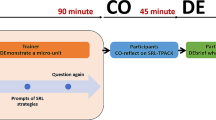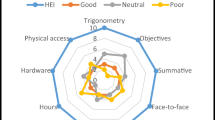Abstract
This case study survey investigates the Technological Pedagogical Contextual Knowledge (TPCK) of Science Teacher Candidates (STC) across different years of study in the Topic of Renewable Energy (TRE). In line with the transformative model, the study treats TRE-TPCK as a new knowledge domain emerging from the interaction between content, technology, pedagogy and contextual knowledge. Participants were 36 Science Education students who were in their 1st, 2nd, 3rd and 4th years of study during the 2014–2015 academic year. Teacher candidates’ TPCK was identified through semi-structured interviews based on (1) Vignettes, (2) Anecdotes from a teacher named Zeynep and the (3) Content Presentation Technique (CPT). The data were analyzed by using the content analysis technique. The findings showed that the TRE-TPCK of teacher candidates across different years of study was at a similar and less-than-ideal level. STCs in different years of study mostly disregarded the macro and meso contexts when teaching the topic of renewable energy and were partially competent in the sub-meso, micro and sub-micro contexts. They particularly lacked technology-integrated evaluation knowledge when teaching TRE.





Similar content being viewed by others
Explore related subjects
Discover the latest articles, news and stories from top researchers in related subjects.Notes
Data from the CPTs and the descriptions from Zeynep were analyzed holistically with the data from the vignette-based interviews.
Throughout all interviews, the vignette was presented to teacher candidates.
References
Akaishi, A., & Saul, M. (1991). Exploring, learning, sharing: Vignettes from the classroom. The Arithmetic Teacher, 39(3), 12.
Akkoç, H. (2007). Matematik Öğretiminde Bilgisayar Kullanımının Sınıf Pratiğine Entegrasyon Süreci: İntegral Kavramı, EDU7, Yeditepe Üniversitesi Eğitim Fakültesi Dergisi, 2(2), 1–15.
Angeli, C., & Valanides, N. (2009). Epistemological and methodological issues for the conceptualization, development, and assessment of ICT–TPCK: Advances in technological pedagogical content knowledge (TPCK). Computers & Education, 52, 154–168.
Barnett, J., & Hodson, D. (2001). Pedagogical context knowledge: Toward a fuller understanding of what good science teachers know. Science Education, 85(4), 426–453.
Becker, J. H., & Riel, M. M., (2001). Teacher professional engagement and constructivist compatible computer use, Report no. 7, Teaching, Learning, and Computing Project Online: http://www.crito.uci.edu/tlc/findings/report_7
Borko, H., & Putnam, R. T. (1996). Learning to teach. In D. C. Berliner & R. C. Calfee (Eds.), Handbook of educational psychology (pp. 673–708). New York: Macmillan.
Bozkurt, O., & Kaya, O. N. (2008). Teaching about ozone layer depletion in Turkey: Pedagogical content knowledge of science teachers. Public Understanding of Science, 17, 261–276.
Chai, C. S., Koh, J. H. L., & Tsai, C.-C. (2013). A review of technological pedagogical content knowledge. Journal of Educational Technology & Society, 16(2), 31-51.
Cuban, L. (2001). Oversold and underused: Computers in the classroom. Cambridge: Harvard University Press.
Erickson, F. (1986). Qualitative methods in research on teaching. In M. C. Wittrock (Ed.), Handbook of research on teaching (3rd ed., pp. 119–161). New York: Macmillan.
Ertmer, P. A., & Ottenbreit-Leftwich, A. T. (2010). Teacher technology change: How knowledge, confidence, beliefs, and culture intersect. Journal of Research on Technology in Education, 42(3), 255–284.
Falk, J. H., & Dierking, L. D. (2000). Learning from museums: Visitor experiences and the making of meaning. Walnut Creek: Altamira Press.
Gess-Newsome, J. (1999). Pedagogical content knowledge: An introduction and orientation. In J. Gess-Newsome & N. G. Lederman (Eds.), Examining pedagogical content knowledge (pp. 3–17). Dordrecht: Kluwer.
Gray, L., Thomas, N., & Lewis, L. (2010). Teachers’ use of educational technology in US public schools: 2009. First Look. NCES 2010-040. National Center for Education Statistics.
Grimes, D., & Warschauer, M. (2008). Learning with laptops: A multi-method case study. Journal of Educational Computing Research, 38(3), 305–332.
Herring, M. C., Koehler, M. J., & Mishra, P. (Eds.). (2016). Handbook of technological pedagogical content knowledge (TPACK) for educators. New York: Routledge.
Jeffries, C., & Maeder, D. W. (2011). Comparing vignette instruction and assessment tasks to classroom observations and reflections. The Teacher Educator, 46, 161–175.
Karahan, E. (2014, Eylül). Fen Öğretmenlerinin Teknolojik Pedagojik Alan Bilgilerinin Bağlam Faktörü Açısından İncelenmesi: Amerika Birleşik Devletleri (ABD) Örneği. XI. Ulusal Fen Bilimleri ve Matematik Eğitimi Kongresi’nde sunulan bildiri, Çukurova Üniversitesi, Eğitim Fakültesi, Adana. TR.
Karasar, N. (1984). Bilimsel Araştırma Yöntemi. Ankara: Hacettepe Taş Kitapçılık Ltd. Şti.
Kaya, O. N. (2009). The nature of relationships among the components of pedagogical content knowledge of preservice science teachers: ‘Ozone layer depletion’ as an example. International Journal of Science Education, 31, 961–988.
Kaya, O. N. (2010). Fen Bilgisi Öğretmen Adaylarının Teknolojik Pedagojik Alan Bilgisinin ve Sınıf İçi Öğretim Becerilerinin Araştırılması ve Geliştirilmesi. 109K541 nolu TÜBİTAK-SOBAG 1001 Projesi.
Kelly, M. (2007). Culturally sensitive teaching with technology: Implementing TPCK in culturally mixed contexts. In R. Carlsen, K. McFerrin, J. Price, R. Weber, & D. Willis (Eds.), Proceedings of Society for Information Technology & Teacher Education international conference 2007 (pp. 2199–2202). Chesapeake: AACE Retrieved December https://www.learntechlib.org/p/24916/.
Kelly, M. A. (2008). Bridging digital and culturel divides TPCK for equity of access to technology. In AACTE (Ed.), The Handbook of Technological Pedagogical content knowledge (TPCK) for educators (pp. 30–60). New York: Routledge.
Kelly, M. (2010). Technological pedagogical content knowledge (tpack): A content analysis of 2006-2009 print journal articles. In D. Gibson & B. Dodge (Eds.), Proceedings of Society for Information Technology & Teacher Education International Conference 2010 (pp. 3880–3888). Chesapeake: AACE Retrieved from https://www.learntechlib.org/p/33985/.
Koh, J. H. L., Chai, C. S., & Tay, L. Y. (2014). TPACK-in-action: Unpacking the contextual influences of teachers' construction of technological pedagogical content knowledge (TPACK). Computers & Education, 78, 20–29.
Kozma, R. (Ed.). (2003). Technology, innovation and educational change: A global perspective. Eugene: International Society for Technology in Education.
Loughran, J., Berry, A., & Mulhall, P. (2006). Understanding and developing science teachers' pedagogical content knowledge. Rotterdam: Sense Publishers.
Magnusson, S., Krajcik, J., & Borko, H. (1999). Nature, sources, and development of pedagogical content knowledge for science teaching. In J. Gess-Newsome & N. Lederman (Eds.), Examining pedagogical content knowledge (pp. 95–132). Dordrecht: Kluwer.
Mishra, P., & Koehler, M. J. (2006). Technological pedagogical content knowledge: A framework for teacher knowledge. Teachers College Record, 108(6), 1017–1054. https://doi.org/10.1111/j.1467-9620.2006.00684.x.
Mohapatra, S. (2015). Business school education and technology–a case study. Education and Information Technologies, 20(2), 335–346.
Morine-Dershimer, G., & Kent, T. (1999). The complex nature and sources of teachers’ pedagogical knowledge. In J. Gess-Newsome & N. G. Lederman (Eds.), Examining pedagogical content knowledge (pp. 21–50). Dordrecht: Kluwer Academic.
Patton, M. Q. (1987). How to use qualitative methods in evaluation. Newbury Park: Sage.
Porras-Hernάndez, L. H., & Salınas-Amescua, B. (2013). Strengthenıng Tpack: A broader notion of context and the use of teacher’s narratives to reveal knowledge constructıon. Journal of Educational Computing Research, 48(2), 223–244.
Rugayah, H., Hashim, H. & Wan, N. M. (2004). Attitudes toward learning about and working with computers of students at unit. The Turkish Online Journal of Educational Technology (TOJET), 3(2). 24-35.
Sarkar, S., Mohapatra, S., & Sundarakrishnan, J. (2017). Assessing impact of technology based digital equalizer programme on improving student learning outcomes. Education and Information Technologies, 22(1), 195-213
Selinger, M. (2001). Learning information and communications technology skills and the subject context of the learning. Journal of Information Technology for Teacher Education, 10(1–2), 143–156.
Shulman, L. S. (1986). Those who understand knowledge growth in teaching. Educational Researcher, 15(2), 4–14.
Shulman, L. S. (1987). Knowledge and teaching: Foundations of the new reform. Harvard Educational Review, 57(1), 1–22.
Smith, M. R. (1994). Professional development of science teaching via distance technology. Paper presented at the Rural and Small Schools Conference. Manhattan, KS.
Suh, Y. (2005). Pedagogıcal Content knowledge Development ın Teaching Science: A Case Study of an Elementrary School Teacher ın an Urban Classroom. Unpublished doctoral dissertation. Teachers College, Columbia University, New York, NY.
Suharwoto, G. (2006). Secondary mathematics preservice teachers’ development of technology pedagogical content knowledge in subject-specific, technology-ıntegrated teacher preparation program. Unpublished doctoral dissertation. Corvallis, OR: Oregon State University.
Vazquez-Alonso, A., & Manassero-Mas, M. A. (1999). Response and scoring models for the 'views on science-technology-society' instrument. International Journal of Science Education, 21(3), 231–247.
Votaw, N. L. (2008). Impact of an informal learning science camp on urban, low socioeconomic status middle school students and participating teacher-leaders. Unpublished doctoral dissertation. University of Louisville.
Wu, Y.-T. (2013). Research trends in technological pedagogical content knowledge (TPACK) research: A review of empirical studies published in selected journals from 2002 to 2011. British Journal of Educational Technology, 44(3), E73–E76.
Yıldırım, A., & Şimşek, H. (2016). Sosyal Bilimlerde Nitel Araştırma Yöntemleri (10.Baskı). Ankara: Seçkin Yayıncılık.
Yükseköğretim Kurulu (YÖK) (2009). Eğitim Fakültelerinde Uygulanacak Yeni Programlar Hakkında Açıklama. 20 Temmuz 2016 tarihinde erişildi. http://www.yok.gov.tr/egitim/ogretmen/aciklama_program.doc.
Zhao, Y., & Frank, K. A. (2003). Factors affecting technology uses in schools: An ecological perspective. American Educational Research Journal, 40(4), 807–840.
Acknowledgements
Authors of this study thank the anonymous referees and the editor of Education and Information Technologies for their thoughtful comments and suggestions.
Author information
Authors and Affiliations
Corresponding author
Additional information
Publisher’s Note
Springer Nature remains neutral with regard to jurisdictional claims in published maps and institutional affiliations.
This work was produced from the first author's doctoral dissertation.
Appendix Content Presentation Technique
Appendix Content Presentation Technique
Name-Surname: Student Level:
Dear all, please design a lesson plan based on your objectives on the topic of renewable energy by considering the management, physical infrastructure (labs, smart boards, computers, the internet, location, etc.), students (interest in science, attitudes, anxiety, achievement, peer relations), and parent profile (literacy level, socioeconomic level, environment, etc.) of the school defined in the table (a state school in a central area). Please answer the questions below with your reasons. Thank you.

Rights and permissions
About this article
Cite this article
Karakaya Cirit, D., Canpolat, E. A study on the technological pedagogical contextual knowledge of science teacher candidates across different years of study. Educ Inf Technol 24, 2283–2309 (2019). https://doi.org/10.1007/s10639-018-9845-9
Received:
Accepted:
Published:
Issue Date:
DOI: https://doi.org/10.1007/s10639-018-9845-9




